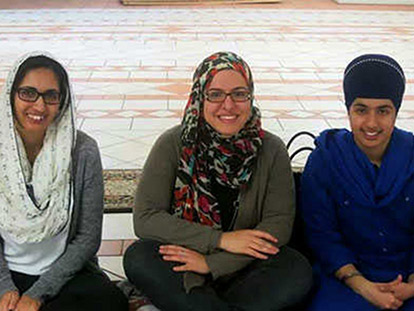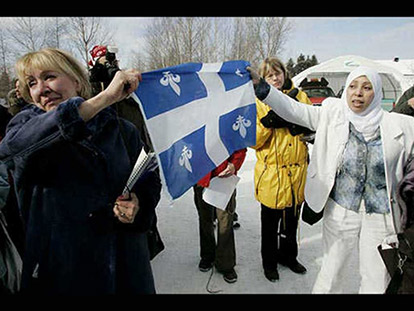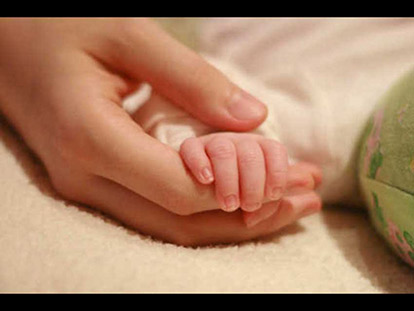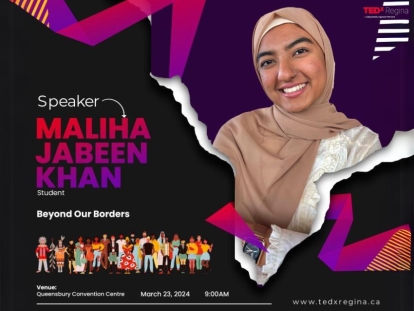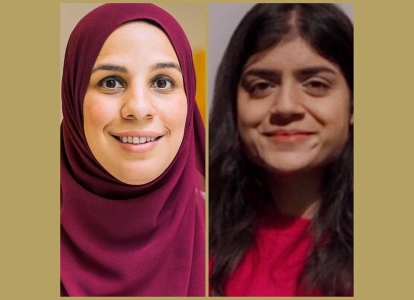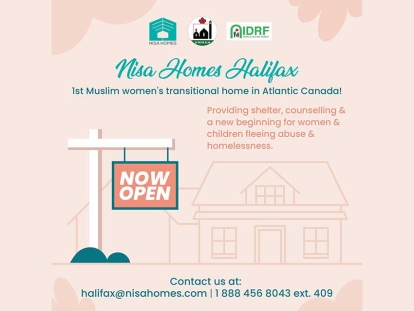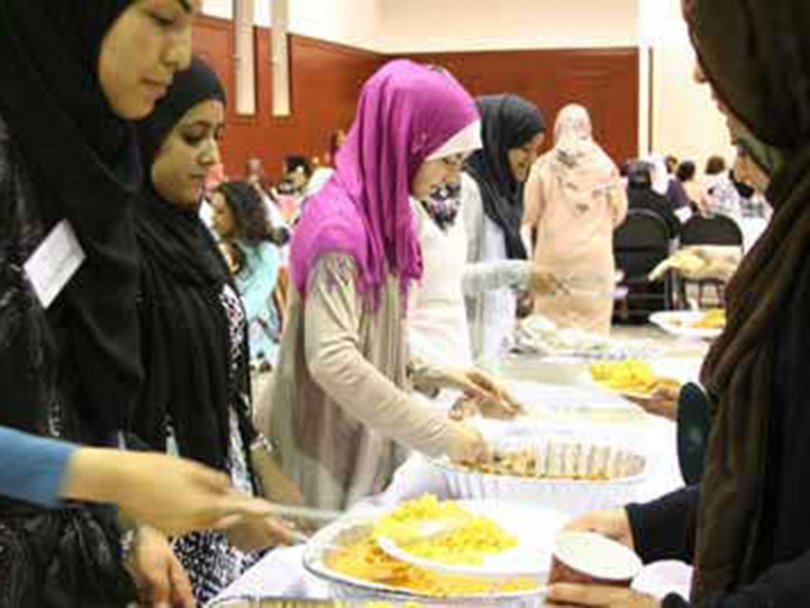 Guests at a community dinner hosted by the Amal Center for Women in Montreal.
Photo Credit: Amal Center for Women
Guests at a community dinner hosted by the Amal Center for Women in Montreal.
Photo Credit: Amal Center for Women
Apr
Nestled between the fruit markets and video stores on a busy street in St-Laurent, many may pass by the modest bureau of the Amal Center for Women without a second glance. An inconspicuous sign at the front door leads the way up a flight of stairs to the center's office, where Muslim women from different parts of the city come together to bring hope to those that need it most.
The idea for the Amal Center was conceived in early 2002, when a group of Muslim women met with community leaders in Montreal to discuss the growing problem of conjugal violence and the need for a Muslim organization that would provide shelter as well as proper Islamic counseling and support for victims of domestic abuse. Although the group realized that establishing a shelter could take several years, they decided to start by opening a women's center, and hence Amal (Arabic for hope) was born.
Run by a board of nine directors, three paid staff and a host of volunteers, Amal Center provides a variety of free services for the community, including counseling, advocacy, family and youth services, educational events, social activities and referral services. For many years, Amal has consistently organized a Ramadan food basket program, feeding families in need.
As part of its outreach services, Amal also organizes workshops and events to raise awareness about domestic abuse. The center works in conjunction with various non-Muslim shelters, to provide support for the Muslim women who come there for help. Although Amal is committed to serving the family unit and Muslim community at large, their primary focus remains on women and children. Working under the high standards of values such as professionalism and confidentiality, Amal's doors are open to anyone in need, irrespective of their religious background.
For Dr. Fyeza Hasan, Vice-President of Amal, working with the center is a means to live the teachings and values of Islam through her actions.
“I feel that it's the duty of people like me, who've been blessed in so many different ways, to help others who are less fortunate,” she explains.
“I believe my faith tells me to fight injustice and to right the wrongs that I see around me. For me, this is a way to do it.”
According to Dr. Hasan, the hope that Amal signifies represents many different things.
“It's the idea of giving hope to women who have been in pretty desperate circumstances,” she says.
“It's also the idea of hope in a better future for community. I hope that as we grow we can engage our community in dialogue and help to challenge some of the misconceptions that allow domestic violence to perpetuate.”
Children's programme
One of Dr. Hasan's dreams for the Amal Center in the near future is to establish a children's program to not only provide psychological help for children who have witnessed domestic violence in their homes, but also to show them that violence is neither acceptable nor the norm and work to help break the cycle of violence that is self-perpetuating.
“Domestic violence doesn't just affect the couple involved, children are hugely affected,” she says. “We learn how to live our lives and how to conduct our relationships as a result of what we see as we grow up and children who experience domestic violence are at a higher risk of being in violent relationships as they grow up. This makes it so important that we do something to tackle domestic violence in our community. Each case of domestic violence has the potential to perpetuate further violence in our community.”
Linah Hashimi works at the Amal Center as a counselor. She explains that one of the things that makes the work of Amal so unique and essential is that they are able to reach out to a wide group of women and not only help them in their own language, providing services in English, French, Arabic, Urdu and Hindi, but also provide a knowledge and understanding of both their cultural and religious backgrounds.
“As a community organization that was initiated by the multi-ethnic Muslim community, we strove to offer our services using an anti-oppression framework,” she says.
“Every woman that walks through our doors will be treated with respect, dignity and understanding. We do not impose any particular way of thinking, but we do work to inform women of their rights as humans, Canadians, and if they are interested, as Muslims.”
For Ms. Hashimi, the best reward of working at Amal is watching the transformation of the women she works with each day.
“These women are incredible forces of courage and strength and working with them is a privilege and honour,” she explains.
“They come in discouraged, afraid and frustrated, but still hopeful that there is a way out. After a few weeks, with a little bit of help from us, they are strong, empowered, informed and passionate for their cause. I have seen women fight embassies, face their abusers in court, find work and create a loving home for their children, all at the same time. These women are the real superheroes of this world. They give me hope that things will be better one day.”
Both Dr. Hasan and Ms. Hashimi have found the community response to the establishment of Amal to be encouraging thus far. Being a grassroots organization, Amal is run almost entirely with the support of volunteers and donations.
“Sixty per cent of our funding is from private individuals within the community,” Dr. Hasan says. “Additionally, there are business owners who support us as well. We also have had some help from religious leaders in our community, which has helped us in our mission.”
Widespread problem
Still both agree that much more in needed to help Amal to continue its work, both in terms of volunteer help and financial assistance, as well as in terms of creating meaningful dialogue about the social problems in the community.
“I think by and large the Muslim community does not want to acknowledge what a serious and widespread problem domestic and family violence is in our community,” Ms. Hashimi says.
“I am pretty sure everyone knows at least one family affected by violence, yet many people act surprised when they realize how many clients Amal has. I feel that if Montreal Muslims truly understood the effect this social problem is having on our society, we would have a lot more support.”
Dr. Hasan adds that domestic violence exists in all communities, irrespective of religious, ethnic and socioeconomic backgrounds, and that it's essential to provide specific services tailored to understand the special needs of all the different communities.
Dr. Hasan also believes that certain misconceptions might exist about the work that Amal does.
“We believe in empowering women to make their own choices,” she says. “We don't believe in imposing our choices on women or families, just in helping women to develop strength to deal with their circumstances and encouraging them to make choices that will be safe for them and their children.”
Ms. Hashimi believes there is much the community can do to help support the work that Amal does.
“I think our financial situation is our greatest challenge right now and there are many directions we can go in, but we need the financial support to fund all our projects,” she says. “We are also always looking for more people to donate their ideas, skills and time. I would really love to see some of the young professionals who have skills that could help us, such as social work, child care or legal aid, become involved at our center.”
As Dr. Hasan emphasizes, what is needed is much more than just supporting a single organization, but rather a commitment for real dialogue and action.
“I don't just hope for the community to get involved with Amal,” she says. “I hope that the community will engage with the idea that we need to challenge domestic violence. It's not acceptable in Canada, it's not acceptable regardless of religious background and we need to stand up and talk about this and make it unacceptable in our community. The issue isn't about Amal. It's bigger than that and we need to acknowledge this and act.”
For more information on Amal Center for Women or to make a donation, visit: www.amalwomencenter.ca
Sadia Virk is a freelance journalist based in Montreal.
This article was produced exclusively for Muslim Link and should not be copied without prior permission from the site. For permission, please write to info@muslimlink.ca.


